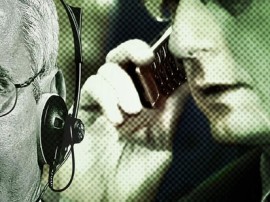Only last week, this was going to be a very different article. It was supposed to detail a bold holding and the creation of a circuit split that was likely to generate debate about the law’s response to mobile technology. However, in an unexpected sua sponte rehearing of United States v. North, the Fifth Circuit withdrew its decision that a federal district court could not authorize a wiretap over a cell phone and a listening post outside of its jurisdiction. The court ultimately determined that the evidence collected from the wiretap should be suppressed, but based on a completely different issue. The court ignored the jurisdictional question altogether. So what happened?
The case involves standard drug-deal monitoring by the Drug Enforcement Administration (DEA). The defendant, North, argued that evidence of a phone call he made while in Texas to another Texas resident, monitored from a Louisiana listening post, should be suppressed since the Mississippi district court that issued the wiretap order did not have jurisdiction in either Texas or Louisiana. In August, the court held that a district court cannot authorize the wiretapping of a cell phone call when neither the cell phone nor the listening post was within the court’s territorial jurisdiction.
The court examined 18 U.S.C. §2518, the procedures for interception of wire, oral, or electronic communication. The statute requires that a judge approve an ex parte order for a wiretap only within his or her jurisdiction. However, in the case of a “mobile interception device,” the limits extend to the entire United States. The Seventh Circuit, interpreting Congressional intent, determined that this exception applies to the wiretapping of cell phones and not the device used for interception. The court rejected the idea that the interception device had to be “mobile,” reasoning that such a reading would not serve public interest in privacy or effectiveness for law enforcement. This holding falls in line with the Eleventh Circuit and certain state courts. In North, the Fifth Circuit firmly rejected this idea, taking a more formalist approach. It limited its analysis to the plain meaning of the statutory language, noting that “mobile” modified “device” and thus could only apply to the method of wiretapping.
The rehearing in October, however, completely ignored the jurisdictional question, a fact not lost on Justice DeMoss, who made this question the centerpiece of his concurrence. The majority upheld its previous disposition, but only discussed the “minimization” requirements. Perhaps the court wanted to avoid a circuit split. Perhaps the court believed its holding would overly restrict law enforcement. Regardless, the opposition to the Seventh Circuit’s interpretation is now lost.
Law enforcement should breathe a sigh of relief over this revamped decision. The Seventh Circuit’s reading of mobile interception device is a more flexible and practical response to the use of cell phones. This reading allows officers and agents to adapt to the unpredictable nature of cell phone monitoring and mobility of suspects. However, such a reading also leaves the possibility of forum manipulation. There appears to be little to prevent law enforcement from dragging a defendant across state lines.
So the withdrawn opinion ultimately has no binding effect on interpretation of “mobile interception device.” Nonetheless, the August opinion and DeMoss’s concurrence at least indicate that the matter is still open for debate and, especially in districts that remain silent on the issue, the plain language reading of the §2518 is still a viable argument. Defendants can incorporate the withdrawn opinion’s reasoning to craft their own formalist argument. Conversely, the government can continue to stress that the only authority on the issue establishes a lenient reading that allows for practical investigation in light of a complex and ever-evolving technology. Either way, with the decline of landlines and increase in movement of people, this will almost certainly be an issue that the courts will have to address again in the near future.
